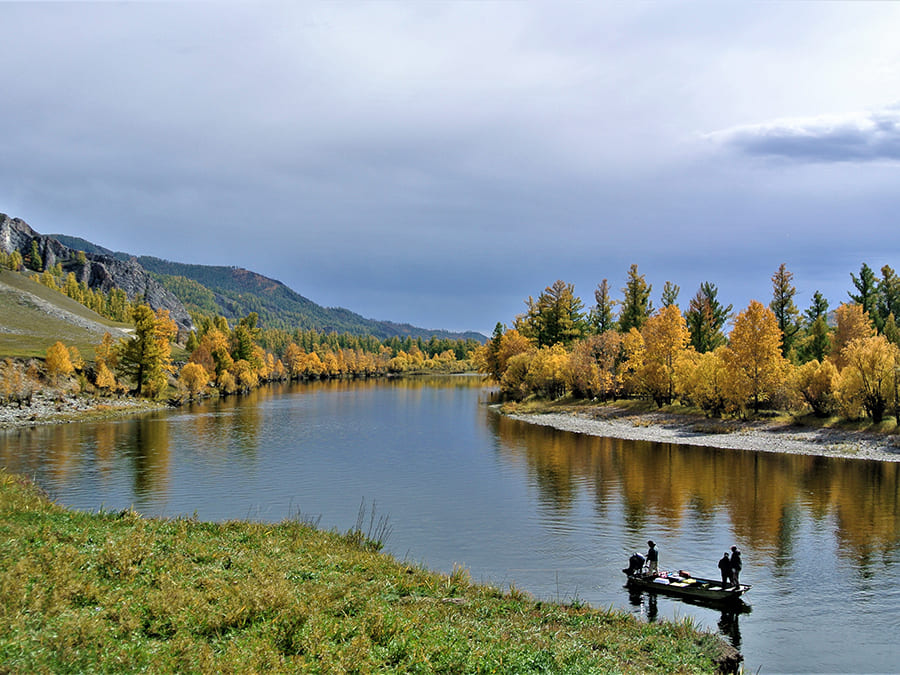A decade of advancement in the field of macrosystems biology – research that encompasses interconnected systems and scales of ecological processes around the world – is summarized in a series of scientific papers published this week.
The special issue, "Macrosystems Biology - Challenges and Successes," published Feb. 1 by the Ecological Society of America, includes eight papers by more than 70 authors from around the world.
“This is an emerged and burgeoning field filled with applications, the eight papers exemplify the directions and importance of looking at the connectivity of people, biodiversity and the function within nature, at broader scales across the globe,” Sudeep Chandra, associate professor of biology at the University of Nevada, Reno and a co-editor of the special issue, said.
The special issue in Frontiers in Ecology and the Environment was coedited by Kansas State University’s distinguished professor of biology, Walter Dodds, with co-editors Chandra and Songlin Fei, professor of forestry and natural resources at Purdue University.
"Macrosystems biology is a new research field that considers large scale biological processes up to and including continental scales," Dodds said. "The issue is a product of a decade of developments in the research field."
The externally reviewed papers capture the current state of macrosystems biology as dynamic and filled with potential as the discipline moves into its next phase.
Flavia Tromboni, a research assistant professor with the University of Nevada, Reno’s Global Water Center and Department of Biology in the College of Science, is the lead author of one of the eight papers, “Macrosystems as metacoupled human and natural systems.” The paper explores how metacoupling applies to the field of macrosystems biology, simultaneously evaluating nearby and distant connections with both ecological and socioeconomic dimensions.
Global scale research
“We live in an increasingly connected world and human impacts are now influencing all locations on earth,” she said. “The 2020 SARS-CoV-2 coronavirus outbreak demonstrated the speed at which a local disease became ubiquitous due to human movement, creating new global socio-economic and environmental dynamics. In this increasingly metacoupled world, proximity may not always predominate, and many processes can bypass one location to influence a more distant one.”
Tromboni said other examples are the increasing frequency of wildfires caused by climate change, and other anthropogenic factors, that transport terrestrial particulate material to further locations or the floods in Ohio in 2018 that caused a terrestrial sediment plume and associated nutrients into the Gulf of Mexico.
“To capture the magnitude of human impacts globally and find solutions for pressing global environmental issues we need to change our point of view and start to consider all these multi-scale interactions,” she said. “This also means we need to increase international collaboration and cooperation. Metacoupling is an extremely relevant framework for current times and a new frontier of research.”
Working in a macro project means traveling a lot and sharing scientific knowledge with scientists from different cultural backgrounds, Tromboni said. “This is an extremely enriching experience that enables a scientist to approach complex ecological problems from new perspectives.”
Chandra and Tromboni are part of an interdisciplinary team of researchers in a U.S. National Science Foundation funded study on rivers that spans continents, using the principles of macrosystems biology. The work, “Collaborative Research: Hierarchical Functioning of River Macrosystems in Temperate Steppes From Continental to Hydrogeomorphic Patch Scales,” provides information for 18 rivers spread equally between the two largest temperate steppe biomes of the world: the North American Great Plains and the Euro-Asian Steppe, including those in Mongolia.
Travel and knowledge sharing across cultures
“The need to understand and manage ecosystems at regional to continental scale macrosystem levels is becoming increasingly crucial with global climate changes and impacts of exotic plants and animals in freshwater rivers and lakes,” Chandra, who is the director of the University of Nevada, Reno’s Global Water Center, said. “What we learn about the similarities and differences from each riverine macrosystem in the U.S. and Mongolia can help predict the future effects in each and allow more effective management approaches.”
For example, most rivers in the USA contain some dams and many exotic fauna have been introduced, while the vast majority of Mongolian rivers contain no dams and their aquatic fauna is almost exclusively natural and different from those in the USA. Mongolia has one of the strongest warming signals on earth, with air temperatures rising three times faster than the overall northern hemisphere average.
In addition to this project, the University of Nevada, Reno is involved in several macrosystems biology research and long-term research efforts to understanding how climate affects the water quality and fisheries in lakes. Through a partnership with UC Davis and other researchers recently published work that quantifies how climate change influences the future ice conditions in mountain lakes from the Sierra, Cascades and Northern Rockies. In addition, the 62-plus year old monitoring from a long-term mountain lake research station at Castle Lake in Northern California links climateand ice dynamics to the production of food and feeding behavior of trout in lakes.
“We hope this special issue will bring a fresh and important look to the emerging field in ecology whose studies have broad implications for society and how we manage nature and understanding relationships in the environment,” Chandra said.
The editorial in the special issue of Frontiers in Ecology and the Environment, Macrosystems Biology – Challenges and Successes,” explains that “the challenge of macrosystems biology is to conduct quantitative, interdisciplinary, and systems-oriented research that helps us understand interconnected patterns and processes from regional to continental scales. Macrosystems biology seeks not a single holy grail but rather a collection of grails, requiring effective collaboration across population and community ecology, biogeography, and biogeochemistry, and possibly other disciplines, all at once. It’s no real surprise that, since its emergence approximately 10 years ago and in light of its inherent complexity, the discipline has yet to reach its full potential.”
















